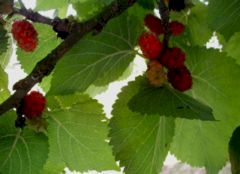|

Mulberry |
The Mulberry tree (Morus nigra) has been cultivated in England since the middle of the sixteenth century, being first planted at Sion house in 1548. It is now grown commonly in the garden, orchard, or paddock, where its well-known rich syrupy fruit ripens in September. This fruit, abounding with a luscious juice of regal hue, is used in some districts, particularly in Devonshire, for mixing with cider during fermentation, giving to the beverage a pleasant taste, and a deep
red color. The juice, made into syrup, is curative of sore throats, especially of the putrid sort, if it be used in gargles; also of thrush in the mouth, if applied thereto; and the ripe fruit is gently |
laxative. Horace recommends that Mulberries be gathered before sunset:
"AEstatis peraget qui nigris prandia moris Finiet ante gravem quae legerit arbore solem."
The generic name, Morus, is derived from the Celtic mor, "black." In Germany (at Iserlohn), mothers, in order to deter their children from eating Mulberries, tell them the devil requires the juicy berries for the purpose of blacking his boots. This fruit was fabled to have become changed from white to a deep red through absorbing the blood of Pyramus and Thisbe, who were slain beneath its shade.
It is thought by some that "morus" has been derived from the Latin word mora, delay, as shown in a tardy expansion of the buds. Because cautious not to burst into leaf until the last frost of spring is over, the Mulberry tree, as the wisest of its fellows, was dedicated by the ancients to Minerva, and the story of Pyramus and Thisbe owed its origin to the white and black fruited varieties:
"The Mulberry found its former whiteness fled, And, ripening, saddened into dusky red."
Shakespeare's famous Mulberry tree, planted in 1609, was of the black species. It was recklessly cut down at New Place, Stratford-on-Avon, in 1759. Ten years afterwards, when the freedom of the city was presented to Garrick, the document was enclosed in a casket made from the wood of this tree. Likewise a cup was wrought therefrom, and at the Shakespeare Jubilee, Garrick, holding the cup aloft, recited the following lines, composed by himself for the occasion:
"Behold this fair goblet: 'twas carved from the tree Which, oh, my sweet Shakespeare, was planted by thee! As a relic I kiss it, and bow at thy shrine, What comes from thy hand must be ever divine."
"All shall yield to the Mulberry tree; Bend to the blest Mulberry: Matchless was he who planted thee, And thou, like him, immortal shall be."
A slip of it was grown by Garrick in his garden at Hampton Court. The leaves of the Mulberry tree are known to furnish excellent food for silk worms.
Botanically, each fruit is a collection of berries on a common pulpy receptacle, being, like the Strawberry, especially wholesome for those who are liable to heartburn, because it does not undergo acetous fermentation in the stomach. In France Mulberries are served at the beginning of a meal. Among the Romans the fruit was famous for maladies of the throat and windpipe.
The tree does not bear until it is somewhat advanced in age. It contains in every part a milky juice, which will coagulate into a sort of Indian rubber, and this has been thought to give tenacity to the filament spun by the silkworm.
The juice of Mulberries contains malic and citric acids, with glucose, pectin, and gum. The bark of the root has been given to expel tapeworm; and the fruit is remarkable for its large quantity of sugar, being excelled in this respect only by the fig, the grape, and the cherry.
We are told in "Ivanhoe" that the Saxons made a favorite drink, "Morat," from the juice of Mulberries with honey. During the thirteenth century these berries were sometimes called "pynes."
In the memorable narrative of the Old Testament, 2 "Samuel", v., 24, "When thou hearest the sound of a going in the tops of the Mulberry trees," the word used (bekhaim) has been mistranslated, really intending the Aspen (Populus tremula).
Herb Simples
The Primitive Simplers presented here show the way of life in other generations, it is not suggested or recommended trying them yourself. |
|
Garden
Herbs
Home
History of Herbs
Herb Gardening
Herbs for Beginners
Drying & Preserving Herbs
Indoor Herb Gardening
Herb Garden
Hints & Tips
Herbal
Cooking
Herb Chart
Using Herbs
Culinary Herbs
Herb
Oil and Vinegar
Herb Teas
Herb Candy
Herb Jelly
Herb Simples
Preface
Introduction
Alphabetical Listing

Trade
Recipes Online
Share your Recipes with others!!
|


